Abstract
The pathogenesis of alcoholic pancreatitis is not fully understood. An increase in pancreatic digestive and lysosomal enzyme synthesis because of ethanol consumption could contribute to the development of pancreatic injury in alcoholics. This study aimed, firstly, to determine the effect of ethanol on the content and messenger RNA levels of pancreatic digestive enzymes and on the messenger RNA level of the lysosomal enzyme cathepsin B, and secondly, to examine the influence of concomitant protein deficiency (a known association of alcoholism and pancreatic injury) on these effects. A rat model of chronic ethanol administration was used in which rats were fed in groups of four, and for four weeks, protein sufficient and protein deficient diets with or without ethanol. Ethanol increased the pancreatic content of lipase but did not influence chymotrypsinogen or trypsinogen values. mRNA levels for lipase, trypsinogen, and chymotrypsinogen were raised in rats fed ethanol. Protein deficiency resulted in reduced tissue levels of lipase, chymotrypsinogen, and amylase but did not influence trypsinogen values. mRNA levels for proteases were increased in protein deficient rats, while those for lipase remained unaltered. Both ethanol and protein deficiency increased mRNA levels for cathepsin B. It is concluded that chronic ethanol consumption, in both protein sufficient and protein deficient states, increases the capacity of the pancreatic acinar cell to synthesise digestive and lysosomal enzymes.
Full text
PDF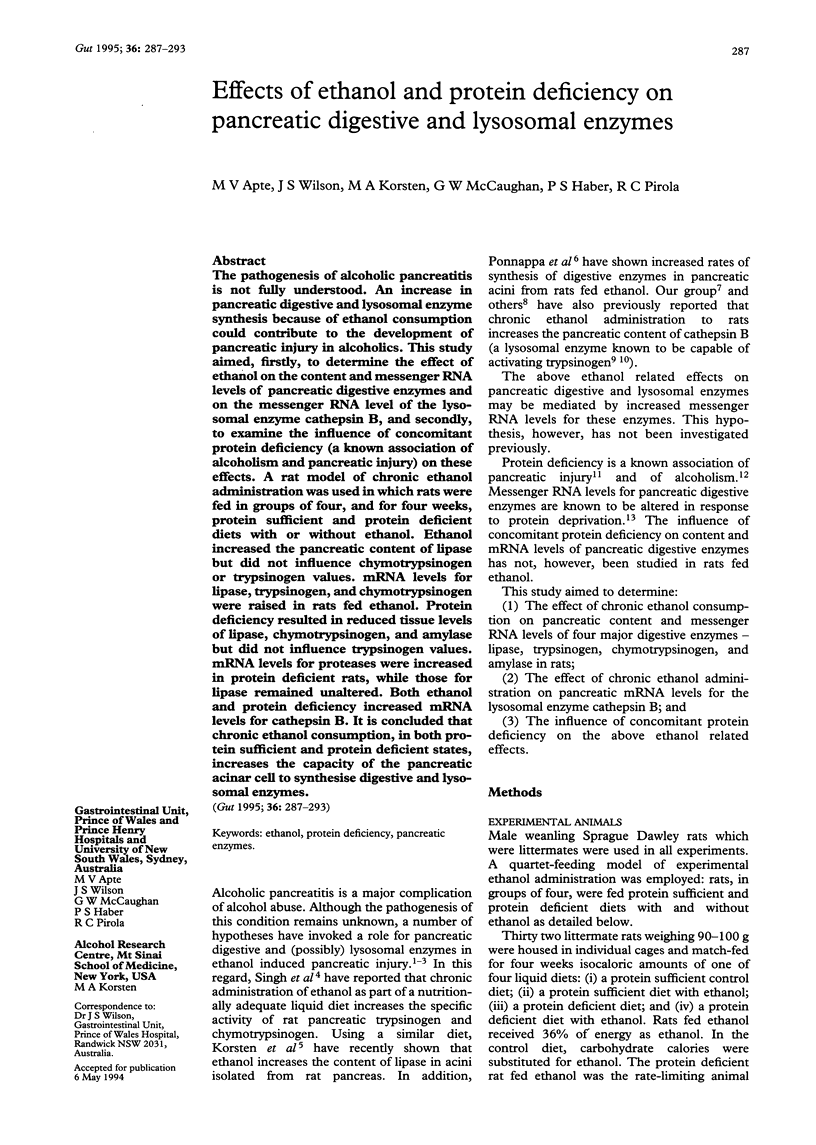
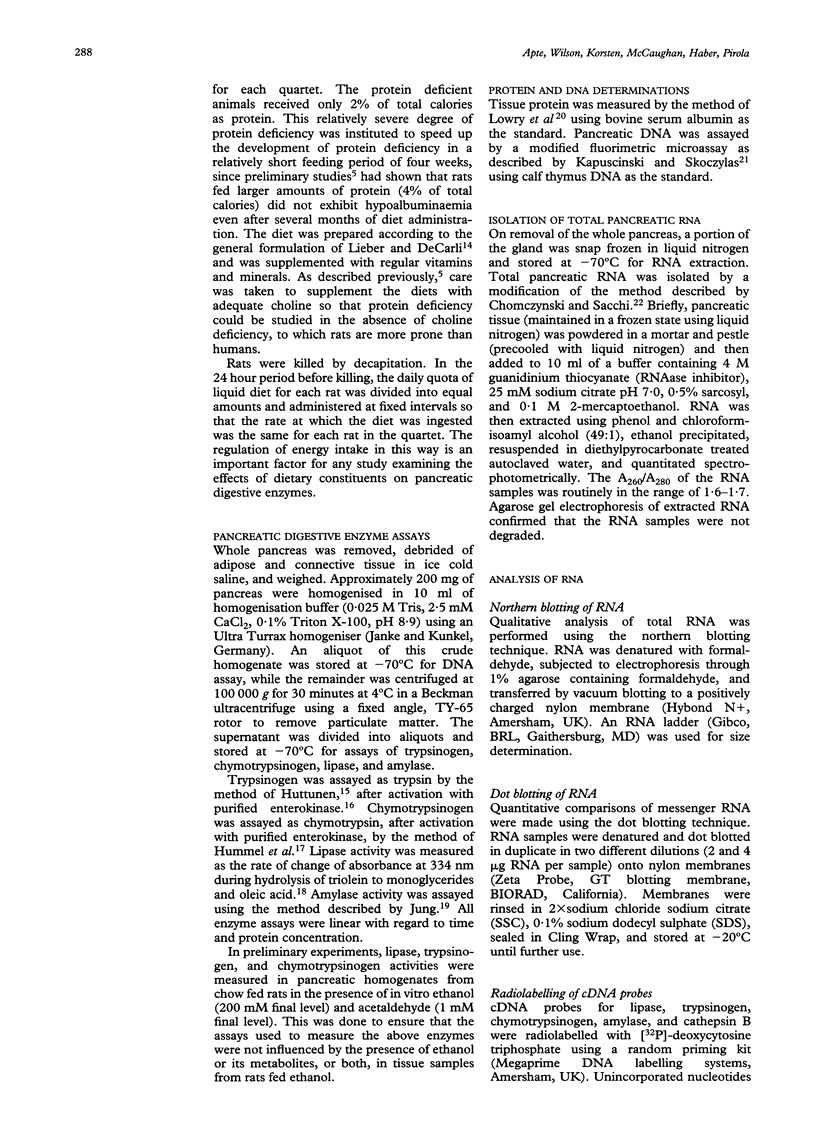
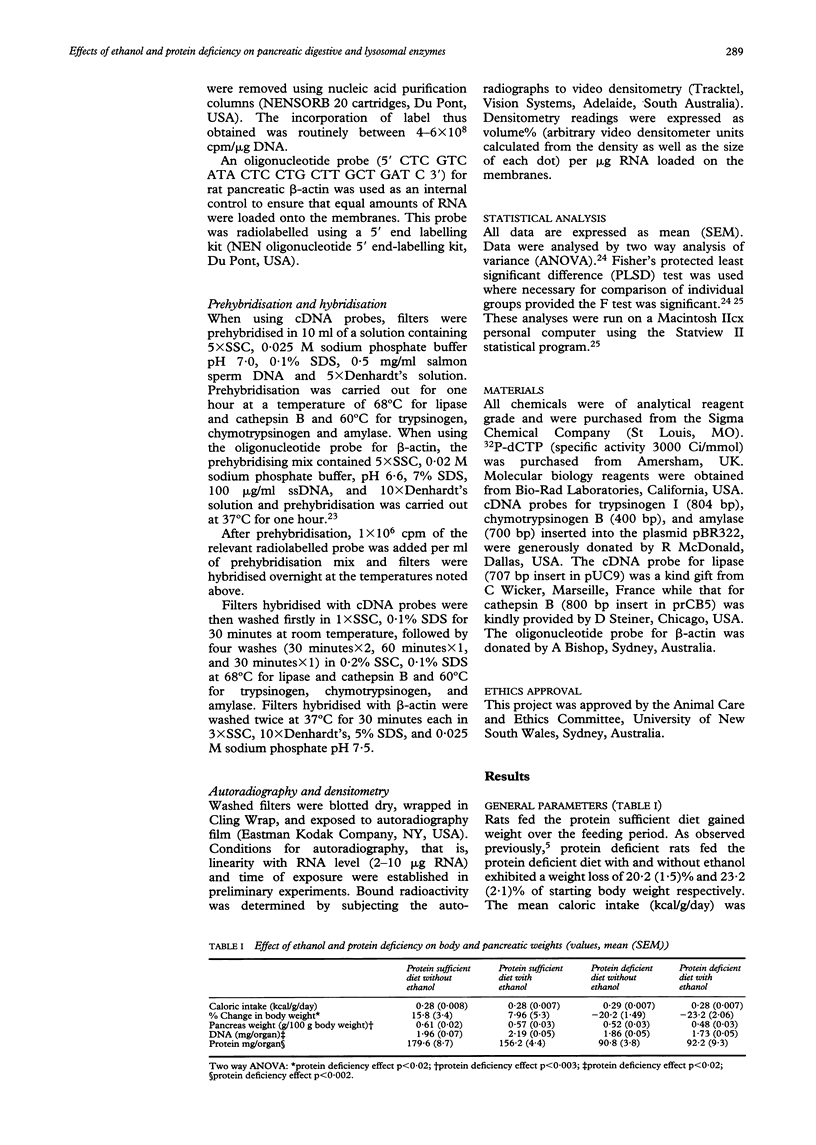
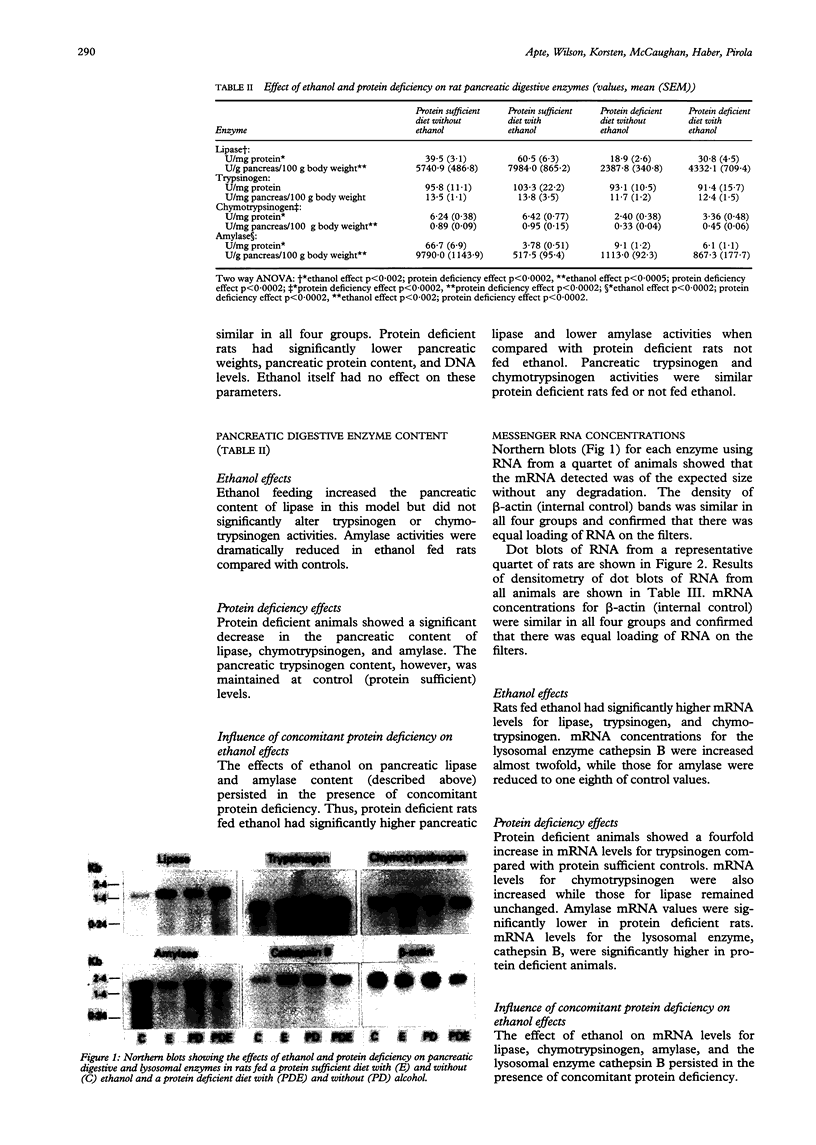
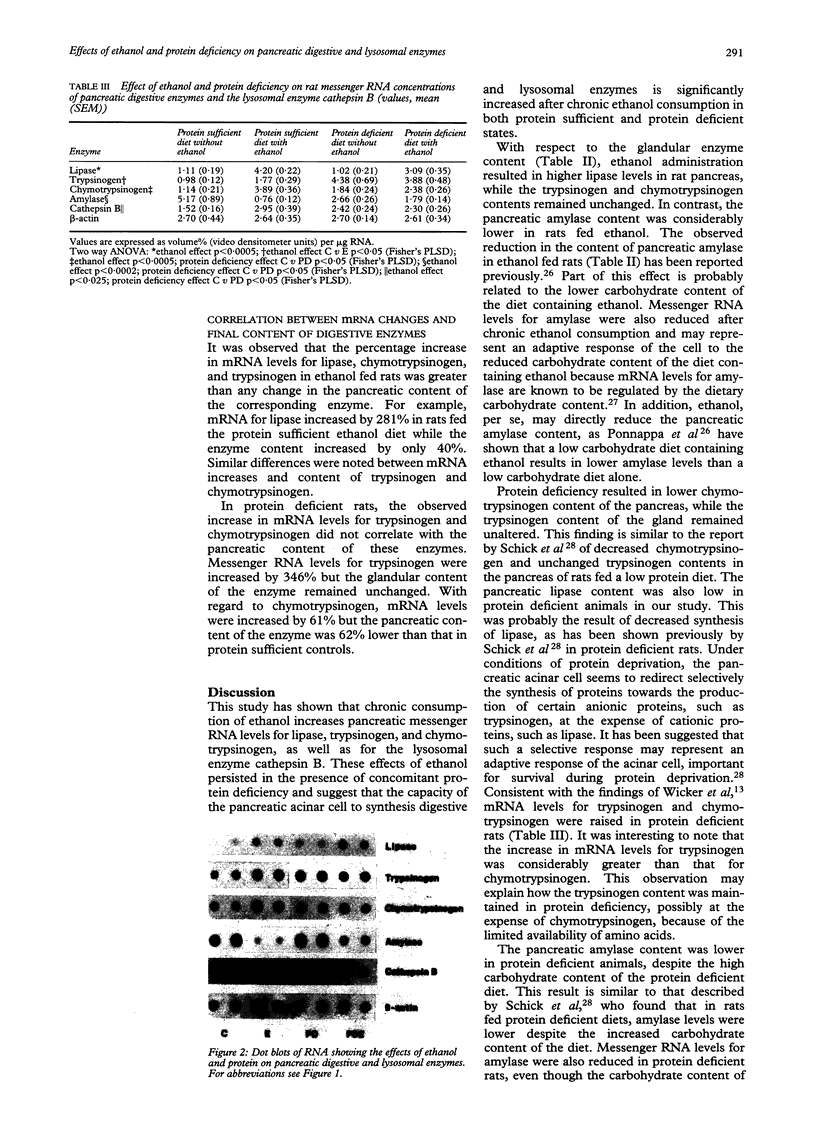
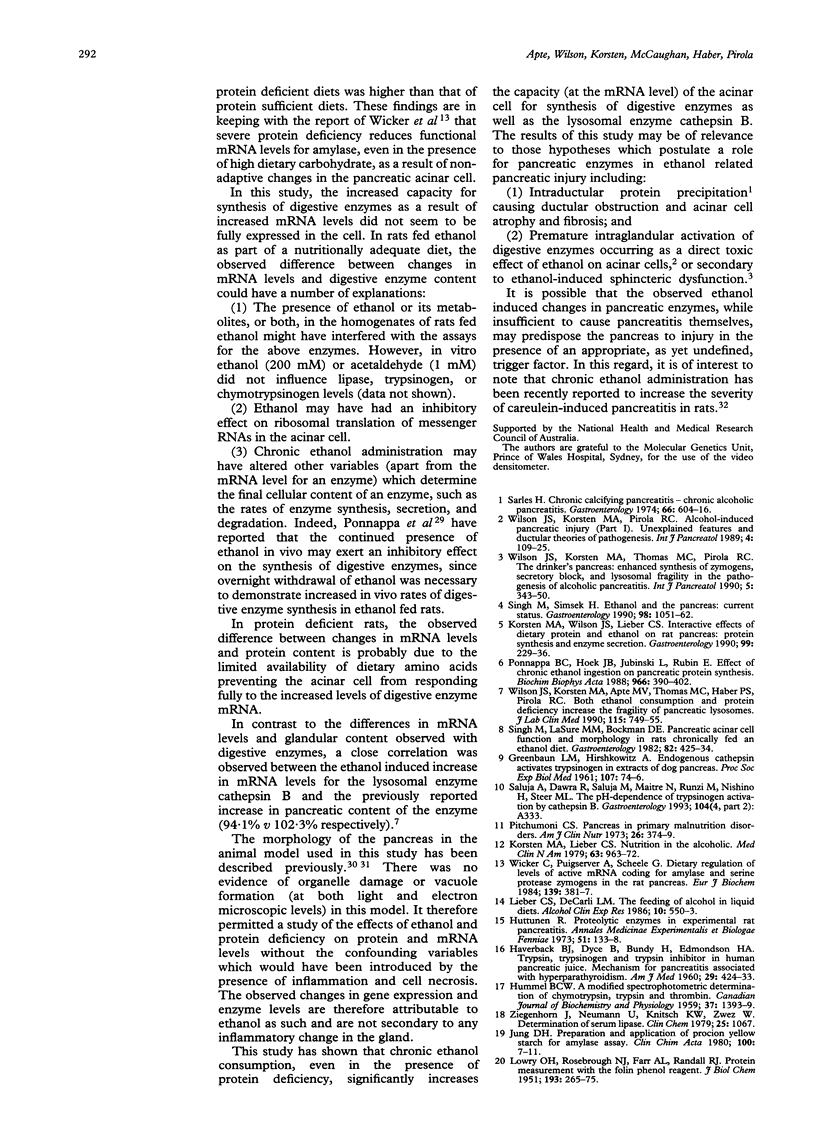
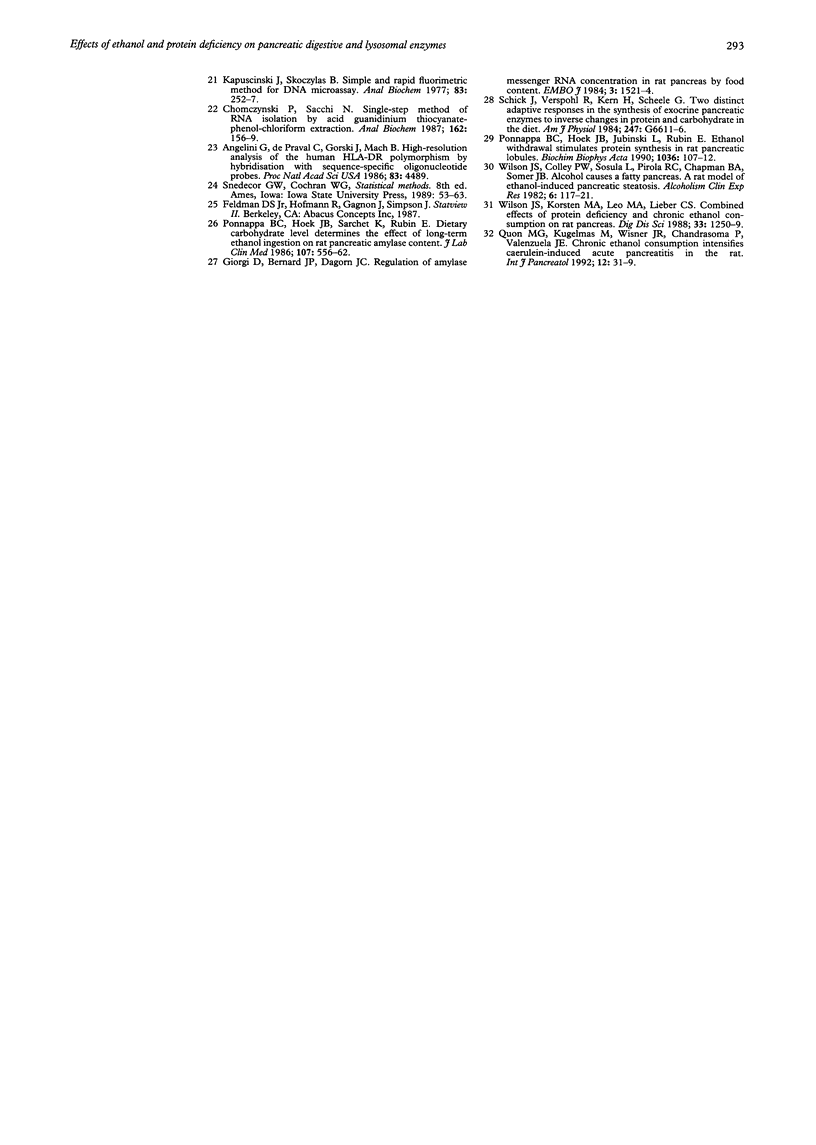
Images in this article
Selected References
These references are in PubMed. This may not be the complete list of references from this article.
- Angelini G., de Preval C., Gorski J., Mach B. High-resolution analysis of the human HLA-DR polymorphism by hybridization with sequence-specific oligonucleotide probes. Proc Natl Acad Sci U S A. 1986 Jun;83(12):4489–4493. doi: 10.1073/pnas.83.12.4489. [DOI] [PMC free article] [PubMed] [Google Scholar]
- Chomczynski P., Sacchi N. Single-step method of RNA isolation by acid guanidinium thiocyanate-phenol-chloroform extraction. Anal Biochem. 1987 Apr;162(1):156–159. doi: 10.1006/abio.1987.9999. [DOI] [PubMed] [Google Scholar]
- GREENBAUM L. M., HIRSHKOWITZ A. Endogenous cathepsin activation of trypsinogen in extracts of dog pancreas. Proc Soc Exp Biol Med. 1961 May;107:74–76. doi: 10.3181/00379727-107-26539. [DOI] [PubMed] [Google Scholar]
- Giorgi D., Bernard J. P., Lapointe R., Dagorn J. C. Regulation of amylase messenger RNA concentration in rat pancreas by food content. EMBO J. 1984 Jul;3(7):1521–1524. doi: 10.1002/j.1460-2075.1984.tb02005.x. [DOI] [PMC free article] [PubMed] [Google Scholar]
- HUMMEL B. C. A modified spectrophotometric determination of chymotrypsin, trypsin, and thrombin. Can J Biochem Physiol. 1959 Dec;37:1393–1399. [PubMed] [Google Scholar]
- Jung D. H. Preparation and application of Procion Yellow starch for amylase assay. Clin Chim Acta. 1980 Jan 1;100(1):7–11. doi: 10.1016/0009-8981(80)90179-5. [DOI] [PubMed] [Google Scholar]
- Kapuściński J., Skoczylas B. Simple and rapid fluorimetric method for DNA microassay. Anal Biochem. 1977 Nov;83(1):252–257. doi: 10.1016/0003-2697(77)90533-4. [DOI] [PubMed] [Google Scholar]
- Korsten M. A., Lieber C. S. Nutrition in the alcoholic. Med Clin North Am. 1979 Sep;63(5):963–972. doi: 10.1016/s0025-7125(16)31653-4. [DOI] [PubMed] [Google Scholar]
- Korsten M. A., Wilson J. S., Lieber C. S. Interactive effects of dietary protein and ethanol on rat pancreas. Protein synthesis and enzyme secretion. Gastroenterology. 1990 Jul;99(1):229–236. doi: 10.1016/0016-5085(90)91252-2. [DOI] [PubMed] [Google Scholar]
- LOWRY O. H., ROSEBROUGH N. J., FARR A. L., RANDALL R. J. Protein measurement with the Folin phenol reagent. J Biol Chem. 1951 Nov;193(1):265–275. [PubMed] [Google Scholar]
- Lieber C. S., DeCarli L. M. The feeding of ethanol in liquid diets. Alcohol Clin Exp Res. 1986 Oct;10(5):550–553. doi: 10.1111/j.1530-0277.1986.tb05140.x. [DOI] [PubMed] [Google Scholar]
- Pitchumoni C. S. Pancreas in primary malnutrition disorders. Am J Clin Nutr. 1973 Mar;26(3):374–379. doi: 10.1093/ajcn/26.3.374. [DOI] [PubMed] [Google Scholar]
- Ponnappa B. C., Hoek J. B., Jubinski L., Rubin E. Effect of chronic ethanol ingestion on pancreatic protein synthesis. Biochim Biophys Acta. 1988 Sep 8;966(3):390–402. doi: 10.1016/0304-4165(88)90090-6. [DOI] [PubMed] [Google Scholar]
- Ponnappa B. C., Hoek J. B., Jubinski L., Rubin E. Ethanol withdrawal stimulates protein synthesis in rat pancreatic lobules. Biochim Biophys Acta. 1990 Nov 9;1036(2):107–112. doi: 10.1016/0304-4165(90)90021-n. [DOI] [PubMed] [Google Scholar]
- Ponnappa B. C., Hoek J. B., Sarchet K., Rubin E. Dietary carbohydrate level determines the effect of long-term ethanol ingestion on rat pancreatic amylase content. J Lab Clin Med. 1986 Jun;107(6):556–562. [PubMed] [Google Scholar]
- Sarles H. Chronic calcifying pancreatitis--chronic alcoholic pancreatitis. Gastroenterology. 1974 Apr;66(4):604–616. [PubMed] [Google Scholar]
- Singh M., LaSure M. M., Bockman D. E. Pancreatic acinar cell function and morphology in rats chronically fed an ethanol diet. Gastroenterology. 1982 Mar;82(3):425–434. [PubMed] [Google Scholar]
- Singh M., Simsek H. Ethanol and the pancreas. Current status. Gastroenterology. 1990 Apr;98(4):1051–1062. doi: 10.1016/0016-5085(90)90033-w. [DOI] [PubMed] [Google Scholar]
- Wicker C., Puigserver A., Scheele G. Dietary regulation of levels of active mRNA coding for amylase and serine protease zymogens in the rat pancreas. Eur J Biochem. 1984 Mar 1;139(2):381–387. doi: 10.1111/j.1432-1033.1984.tb08017.x. [DOI] [PubMed] [Google Scholar]
- Wilson J. S., Colley P. W., Sosula L., Pirola R. C., Chapman B. A., Somer J. B. Alcohol causes a fatty pancreas. A rat model of ethanol-induced pancreatic steatosis. Alcohol Clin Exp Res. 1982 Winter;6(1):117–121. doi: 10.1111/j.1530-0277.1982.tb05389.x. [DOI] [PubMed] [Google Scholar]
- Wilson J. S., Korsten M. A., Apte M. V., Thomas M. C., Haber P. S., Pirola R. C. Both ethanol consumption and protein deficiency increase the fragility of pancreatic lysosomes. J Lab Clin Med. 1990 Jun;115(6):749–755. [PubMed] [Google Scholar]
- Wilson J. S., Korsten M. A., Leo M. A., Lieber C. S. Combined effects of protein deficiency and chronic ethanol consumption on rat pancreas. Dig Dis Sci. 1988 Oct;33(10):1250–1259. doi: 10.1007/BF01536675. [DOI] [PubMed] [Google Scholar]
- Wilson J. S., Korsten M. A., Pirola R. C. Alcohol-induced pancreatic injury (Part I). Unexplained features and ductular theories of pathogenesis. Int J Pancreatol. 1989 Mar;4(2):109–125. [PubMed] [Google Scholar]




